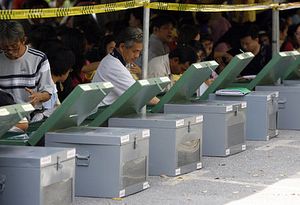After more than 15 years of development, if the new law permits, Thailand’s Election Commission (EC) will introduce an e-voting system for the 2017 general election. They claim the system will make voting more convenient for citizens, speed up the tallying allowing results to be known immediately after the polls close, and reduce the cost of public elections in the long term. Unfortunately, due to a budget insufficient to purchase all the machines simultaneously, they will be available in only 100 polling stations where voters can choose to vote either manually or electronically. However, the e-voting benefits will likely be undermined by a pervasive lack of public trust.
The EC has primarily promoted e-voting on their website, which sports a voting machine simulator which people can try online. To cast a vote electronically, after a manual identification process, a voter can indicate their choice by pushing a button. A paper receipt is then automatically printed out, which the voter may examine and verify before depositing it in a ballot box. This type of machine is most recommended for building people’s faith in the e-voting. This is because the voter can confirm that his vote was recorded as they intended. Receipts from a random sample of polling station can also be manually counted to verify the results of an election and even serve as backups if there are problems with the machine.
Yet, paper receipts alone are not a panacea for guaranteeing accurate and transparent elections. The technical challenges of e-voting are considerable and arise from the complexities of electronic systems and procedures. For instance, software bugs are almost inevitable and can sometimes make computers malfunction in subtle ways that might be undetectable using random sample recounts, as seen in the case of the programming errors in the voting machines in Virginia in 2003. This is not to mention the risk of manipulation by insiders with privileged access to the system or from outside hackers. It is accepted that ideally, the software and hardware used in the system should be scrutinized and certified by an independent testing authority who would then reveal the testing process and its results to the public. All auditing documentation must also be made freely accessible to the public.
Unfortunately, the EC has not as yet publicized any standards or outlined the procedures they have used to test the software and hardware or measures employed to remedy deficiencies. Although their website states that the machines have been tested in various applications ranging from school students’ races to municipal elections and that the machines have been improved as a result of the feedback from the trials, the improvement shown was focused on practicability, such as increasing the size of the choice buttons to make them easier to use, rather than extolling the system’s virtues addressing security issues. Information regarding independent testing agencies is not included either.
Technical and procedural problems are the least of the system’s challenges. It must also overcome the negative socio-political context that could considerably undermine people’s trust in the new system. Thailand has been suffering an acute political crisis and the EC has been perceived as acting partially. Confidence in the EC’s competence is also low. Recently, they have become a public joke after failing in a series of demonstrations designed to test the strength of equipment to be used in the last referendum. The fact that the machines are designed and manufactured by the EC and the Aeronautical Radio of Thailand Ltd (a state enterprise) creates further skepticism about its capacity and appropriateness, as the organization’s responsibilities and competencies are mainly in air traffic control and aeronautical telecommunication services.
To successfully implement the new system, the EC must strive to build public trust which is absolutely essential for any voting system to function effectively. Despite being piloted in only 100 polling stations, the serious technical problems and political disagreement that occurred as a result of the e-voting experiment may arrest further development of this technology for years. The confidence-building process will require more than simply providing information on how to cast a vote electronically, making the machines developed more user-friendly, and extolling the potential benefits of e-voting in general. The EC must develop technical and operational standards and produce appropriate documentation concerning methodology and have their results reviewed by independent security-testing agencies and available to the public. This is particularly crucial in a situation where the public already mistrusts the organization. If they fail, the introduction of e-voting might not only never be socially accepted, but the questionable results might be also be utilized by the losing side to deepen the existing political schisms.
Jittip Mongkolnchaiarunya is a master’s degree candidate in International Affairs concentrating on international security policy at Columbia University’s School of International and Public Affairs.

































